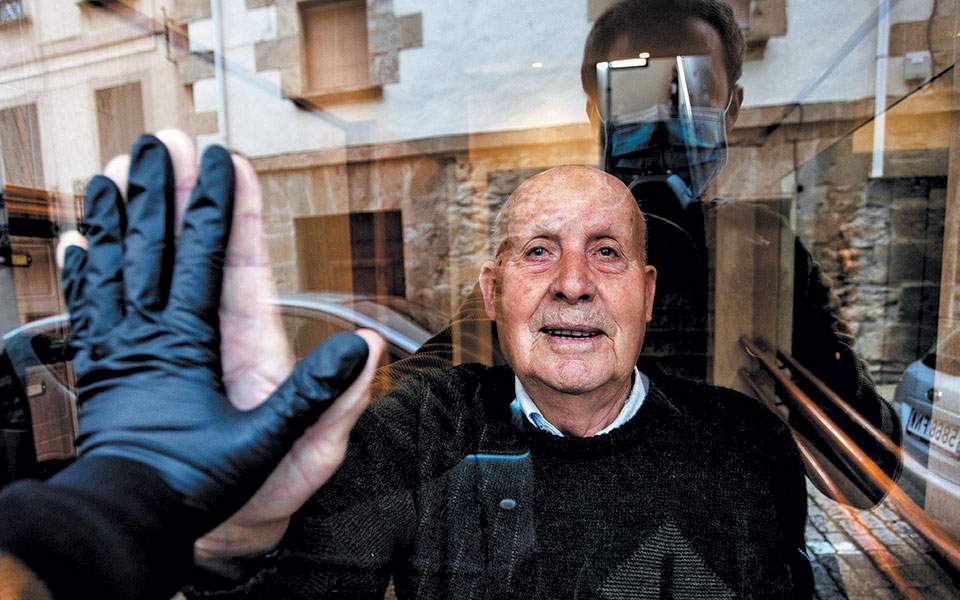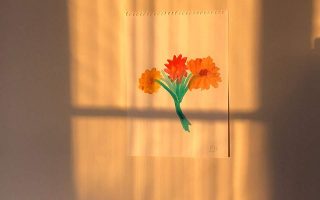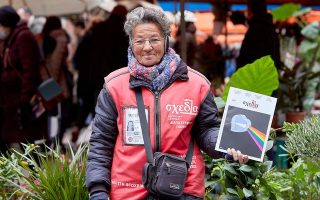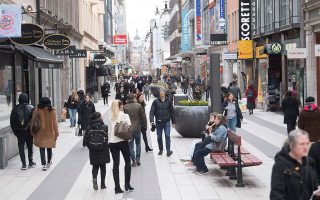Restrictions an endurance test for elderly people

The elderly and pensioners in Greece are accustomed to a life of sacrifice, having served as a bedrock for their families and the country during difficult times.
During the recent economic crisis, they saw their pensions slashed and had to suffer the humiliation of being accused by former socialist politician Theodoros Pangalos of being complicit in the country’s financial demise.
They used their meager pensions to prop up their children and grandchildren, they saw their savings evaporate and they put on a brave face or cried over their new difficulties. And now, just as they thought the country had found its feet, the coronavirus pandemic has dealt it a fresh blow.
“This Easter I spent the holiday alone for the first time. We always used to meet up with my daughters and their families. This year, we said we would stay apart, as a precaution. I miss my grandchildren very much, I’ve been there to watch them grow up. It helps a little that the youngest ones call me regularly and we talk. They care about me and that is the most important thing for me,” Despina Hatzikonstantinou, aged 90, tells Kathimerini.
She lives alone in an apartment. Her daughter does her shopping and brings it to her, taking all the safety measures (mask, gloves, removing shoes). This is the only close contact she has with any person, and only briefly. She used to go to the public swimming pool to exercise, but she had to stop.
“Fortunately, I can go out for a walk; we have a lot of open space in [the northern Athens district of] Papagou. I miss the theater and the cinema, I try to replace them with a movie on TV and more reading,” Hatzikonstantinou says.
Being able to call her friends has also been a tremendous help. “We’ve been through a difficult time recently, when I lost a third of my pension with the bailouts,” she explains.
But her most painful memories, especially in the early days of the lockdown, concerned sad events from her childhood.
“I was shocked to see the corpses in northern Italy, the trucks loading the coffins, the open graves in the United States. My thoughts went back to 1941, when I lost my father from starvation in Athens. [I was] an 11-year-old girl, the open municipal carts were collecting the bloated dead bodies. The occupation, the hunger, the Germans, the resistance, the Civil War in the streets of my neighborhood, Nea Ionia, played in my mind like a movie. Was it necessary for me to remember all that again?” she says.
Her thoughts now leap forward in time: “How long will we seniors need to stay inside?” In the summer, she used to travel to the island of Kalymnos. What will happen this year?
Seventy-three-year-old Kostas Iliopoulos is also in his apartment in Pangrati, where he lives with his wife. “Once again, the proud elderly will have to carry the cross. In 2012, when our son was unemployed, we supported the children. They also had two small children, our grandchildren. Back then, we stayed at home because we didn’t have any money left. We babysat our grandchildren when our son and daughter-in-law had a job and became very attached to them. Now, it hurts a lot that we don’t see them. Sometimes they come over and we talk from the balcony. It’s better than nothing,” he tells Kathimerini.
His health problems mean he has to be particularly careful. “Our children shop and leave us the bags at the door,” he says.
As to when they will be able to leave their isolation, all they know is that they can hardly wait.
Sixty-three-year-old Panagiotis Politis, who has a history of pulmonary health issues that make him particularly vulnerable, is protecting himself by staying in his apartment in the northern Athens suburb of Agia Paraskevi.
“I will not budge from my isolation until a drug and a vaccine have been found. I know that if something happens and I have to go to the hospital, my daughter will feel very burdened and I don’t want that,” he says. “So I follow the safety measures as meticulously as I can. You either do it or you don’t.”
Politis only goes for short walks on roads that are almost deserted and he occasionally turns over the engine of his car to keep the battery from dying. He misses his two grandchildren, aged 3 and 4, whom he only sees on a computer screen.
“I took care of them for many hours because my daughter and son-in-law worked long hours. I did proper babysitting, but from March 10 onward, everything stopped. Nobody enters the house. Even birthdays are celebrated digitally. The candle was blown out on the screen. And the children’s friends applauded on camera,” he explains.
Politis also works from home two to three days a week, while his passion for reading, history and his archives keep him active until late at night. He also participates in an online pilates program twice a week. Food, vegetables and fruit (usually organic) are delivered to his home from small stores which will either stay on the balcony for three days or – if they need refrigeration – will be carefully disinfected by hand.
He says he is quite determined: “I’ll stay inside as long as it is required. I’m not taking any risks.”
Loula Barlow is isolated in her apartment, separated from her daughter and her family by one floor.
“Nevertheless, the children do not come here. They are afraid; they keep their distance. What else can we do? Even the shopping is left on the stairs and our communication is done from the balconies,” she tells Kathimerini.
Her day is spent at home, doing chores, reading and browsing the internet. “To sharpen my mind, I play chess, Scrabble and other games. I am afraid about the next phase, whether the relaxation of the [restrictive] measures will lead to a wider spread of the virus. We all need to be very careful, much more than in the past, especially the elderly,” she says.
In the summer, she usually stayed in Athens, but the sea was always an escape, and not just for its coolness.





